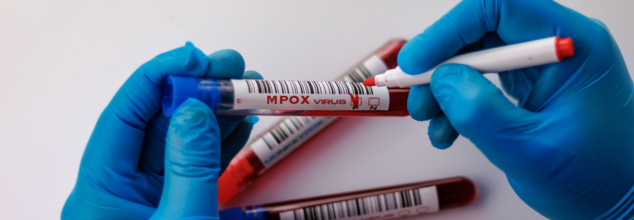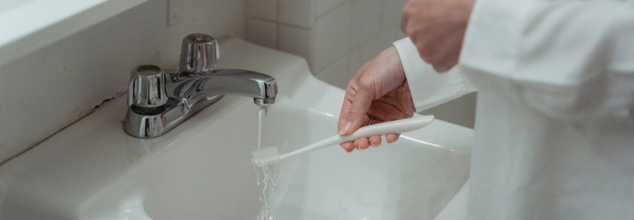- Health Conditions A-Z
- Health & Wellness
- Nutrition
- Fitness
- Health News
- Ayurveda
- Videos
- Medicine A-Z
- Parenting
- Web Stories

Second Mpox case in India confirmed
Mpox In India: Kerala Confirms Second Case In UAE Traveler
India has recently reported a case of Mpox, an infectious disease caused by the monkeypox virus (MPXV), marking a significant health alert. A 38-year-old man from the UAE, who arrived in Kerala last week, has been diagnosed with Mpox. Upon exhibiting symptoms, he was admitted to the Government Medical College Hospital in Malappuram’s Manjeri, where the diagnosis was confirmed. The patient, who had initially self-quarantined at home, is now under medical care in an isolation ward.
Health Minister Veena George emphasized the importance of seeking medical attention if symptoms arise, particularly for those returning from countries with ongoing outbreaks. The Kerala government has responded proactively by preparing isolation wards at 14 hospitals, including medical colleges, to manage any potential escalation.
In addition to the Kerala case, a suspected Mpox patient was also admitted to Delhi’s Safdarjung Hospital last week. This heightened concern follows the World Health Organization's declaration of Mpox as a ‘Public Health Emergency of International Concern’ last month. Despite this designation, experts suggest that while India might see a few imported cases, the likelihood of a widespread outbreak remains low.
India’s health ministry has assured the public that preventive measures are in place. The ministry has stressed that the situation is under control, with contact tracing and containment efforts proceeding according to established protocols. The patient in Kerala is reported to be in stable condition, and officials are actively monitoring and addressing potential exposure risks.
In line with the state government's directives, health officials in Pune and Bangalore have initiated surveillance and testing of individuals suspected of having Mpox. The Pune International Airport has also implemented enhanced monitoring of international travelers to detect any signs of the disease. These measures are in accordance with the guidelines issued by the Government of India.
"Kampegowda International Airport In Bengaluru is fully prepared and compliant with all health and safety protocols issued by relevant authorities in light of the global Mpox situation," a spokesperson for the Bangalore International Airport Limited (BIAL) told the media.
Mpox Symptoms and Prevention
Mpox often begins with flu-like symptoms, including fever, headache, and muscle aches. These are followed by a distinctive rash that typically starts on the face and spreads to other parts of the body.
The rash evolves into pus-filled lesions, which can be mistaken for smallpox or chickenpox. Key symptoms to watch for include swollen lymph nodes, a hallmark of Mpox, and a rash that appears in successive stages.
Prevention:
To prevent Mpox, individuals should practice good hygiene, including frequent handwashing and avoiding close contact with infected persons or animals. Travelers returning from countries with active outbreaks should monitor their health and seek medical attention if symptoms develop.
The use of personal protective equipment and vaccination where available are additional preventive measures. Public health campaigns and awareness programs are crucial in educating people about the symptoms and preventive steps.

Credits: Canva
FDA Greenlights Zevaskyn for Rare Genetic Skin Condition
In a landmark development for patients who live with a rare and painful skin condition, the US Food and Drug Administration or the FDA has approved Zevaskyn (prademagene zamikeracel) for the treatment of recessive dystrophic epidermolysis bullosa or RDEB. This is an inherited disorder that causes the skin to be extremely fragile. I also leads to chronic wounds, bleeding, and tearing even from minor friction or trauma.
As per the 2015 study published in the Journal of Clinical and Aesthetic Dermatology, there are four major subtypes of the skin disorder, which comes from the heterogeneous group of inherited mechanobullous disorder hat is caused by mutation in genes that encode structural proteins in the skin. The overall condition is referred to as epidermolysis bullosa, and one of its type is RDEB, which further comes with two main subtypes of dystrophic EB.
Zevaskyn is now the first and only autologous cell-based gene therapy approved for both adult and pediatric patients living with this life-altering condition.
Why Is This A Breakthrough In Gene Therapy?
Zevaskyn represents a new era in wound care and gene therapy. Unlike traditional treatments that only manage symptoms, this one-time surgical application targets the underlying genetic mutation responsible for RDEB. The therapy uses the patient's own skin cells, which are genetically modified to produce a functional version of the missing COL7A1 gene, critical for anchoring skin layers together.
"Zevaskyn is not just a bandage—it’s a breakthrough that may help change the course of this disease for many," said Madhav Vasanthavada, Ph.D., Chief Commercial Officer at Abeona Therapeutics, the biopharmaceutical company behind the treatment.
How Was It Approved?
The FDA based its approval from the results of two clinical trials: a phase 1/2a study and the pivotal phase 3 VITAL study.
Phase 1/2a Trial: In this study, seven patients with 38 chronic wounds received a single Zevaskyn application. Researchers observed a significant and long lasting improvement at treated sites during the median follow-up of seven years.
Phase 3 VITAL Study: This was a larger study that included 43 patients with large unhealed or non healing wounds. After six months, 81% of those wounds treated by Zevaskyn, showed at least 50% healing, as compared to only 16% in the control group, who had received the standard care.
These outcomes were not only statistically significant but also clinically meaningful, especially for patients who have previously struggled with limited treatment options.
Zevaskyn also showed a favorable safety profile across both studies. No treatment-related serious adverse events were reported. The most common minor side effects were procedural pain and itching, affecting approximately 5% of participants.
"This therapy offers hope for patients and families who have lived too long without effective solutions," said Vasanthavada. “We’re confident in Zevaskyn’s ability to deliver long-term results and are committed to making it widely accessible.”
Access For Patients
To ensure access, Abeona Therapeutics plans to collaborate with both commercial insurers and government payers. The company aims to develop outcome-based agreements that reflect the long-term benefits of a single application of Zevaskyn, reducing the need for repeat procedures or ongoing wound care costs.
With FDA approval, Zevaskyn is set to be a game-changer in the treatment of recessive dystrophic epidermolysis bullosa—offering patients more than just relief, but a meaningful step toward healing.

Credits: Canva
Florida Also Lines Up To Ban Fluoride From Public Water Systems
Florida is on the brink of becoming the second taste to ban fluoride in public drinking water. It will join Utah, which had become the first state to enact the ban just last month. While this was opposed by dentists and national health organizations, who had also warned against this move to lead to more medical problems, dental problems and also affecting low-income communities disproportionately, Spencer Cox, Republican Gov. Signed the legislation regardless.
The Controversial Bill
The bill has received final approval from Florida lawmakers on Tuesday and is now being headed to Republican Governor Ron DeSantis' desk for approval. DeSantis' administration has been an outspoken critic of adding fluoride to community water systems. They have argued that high fluoride levels could potentially affect children's intellectual development. The same concern was quoted by Cox to ban fluoridated water. This is based on the paper published in the medical journal JAMA Pediatrics that concluded that there may be a link between high levels of fluoride and lower Intelligence Quotient (IQ). Their research indicated a possible neurodevelopmental harm to pregnant people or young children if they are exposed to drinking water containing at least 1.5 milligrams of fluoride per litre- a level more than twice what's recommended (0.7 mg/L) for the US water supply. It is important to note that in many American states and Western countries, pregnant women and children receive fluoride from many sources, making their exposure to this mineral way too high from the recommended levels.
However, the study does not the safe levels of fluoridated water which is safe for use. In fact, these levels are also regulated by the US Food and Drug Administration (FDA).
What Do The Republicans Want?
The bill, sponsored by Republican state Representative Kaylee Tuck, does not explicitly mention fluoride but mandates the removal of fluoride and other additives from the state's water systems.
According to Tuck, the legislation focuses on removing additives related to health, rather than water quality itself. "Anything that relates to water quality, removing contaminants, things like that, we're not touching that," she stated. "It's anything that has to do with health, so fluoride, vitamins, whatever else it is."
The Resistance
There has been local resistance to from the local authorities in Florida. The Miami-Date County Mayor Daniella Levine Cava expressed her dismay with this move and stated that this will undermine the overwhelming support of medical professionals for the practice of fluoridating water. She said that ending fluoridation could lead to harmful consequences, especially for the vulnerable families, who would lost access to a cost-effective method of preventing tooth decay.
Fluoridation has been a standard practice in many parts of the U.S. for decades, and it has been credited with significantly reducing the incidence of cavities. According to the Centers for Disease Control and Prevention (CDC), fluoride helps to strengthen tooth enamel and make it more resistant to cavities.
Health Benefits Of Flouride
Fluoride is a naturally occurring mineral that plays an essential role in maintaining strong, healthy teeth. It helps replace minerals lost from tooth enamel due to normal wear and tear. Additionally, fluoride can help reverse early signs of tooth decay by remineralizing the enamel. It also reduces the production of acids by bacteria in the mouth, which further helps prevent plaque buildup.
Beyond dental health, fluoride is also beneficial for bones. It stimulates new bone formation and has been shown to protect against conditions like osteoporosis. As such, fluoride is not only important for dental care but also for overall skeletal health.

(Credit-Canva)
Leukemia Can Now Be Treated By New Immune Cell Treatment
Cancer is an umbrella term for abnormal excess growth that can occur in any part of the body. Leukemia is the cancer of blood, which means there is rapid growth of abnormal blood cells. This growth starts in the bone marrow, which is where your body makes blood. The Cleveland Clinic explains that unlike other cancers, leukemia does not form a mass or tumor that can be detected in a CT scan.
The usual treatment of Leukemia involves Chemotherapy, whether by pill, injection into your vein or a shot under your skin. Another treatment for it is immunotherapy which uses a drug to boost your body’ defense system so that it can fight the cancer itself. Now, a research by American Association for Cancer Research April 2025, has revealed that a pre-made version of immunotherapy can effectively fight blood cancers. This "off-the-shelf" approach offers a potentially faster and easier way to deliver this powerful therapy to patients in need.
Promising Treatment Against Blood Cancer
This new way to treat blood cancer uses special immune cells called natural killer cells, or NK cells. These NK cells have been changed in a lab to have special tools, called CARs, that help them find and kill cancer cells. What's really helpful is that these CAR NK cells can be made ahead of time from healthy people and stored. This means doctors can just take them off the shelf and give them to patients who need them quickly, without having to wait for a treatment to be made just for them, making the whole process much simpler and faster.
The results from using this ready-made CAR NK cell treatment yielded promising results, especially for people with a type of blood cancer called acute myeloid leukemia, or AML. The scientists found that after getting this treatment, some of the patients with AML had their cancer completely disappear. This is called complete remission, and it means there were no signs of cancer left in their blood. These early successes give a lot of hope for a new and better way to treat this difficult disease.
Notably, AML is a very fast-growing and serious cancer. According to American Cancer Society this cancer develops in the myeloid cell, the cells that would normally become white blood cells. This type of cancer develops quickly, hence needs to be treated with the same urgency.
Who Does This Treatment Help?
The first group of patients who received this ready-made CAR NK cell treatment were people whose leukemia had either stopped responding to other treatments or had come back after treatment. These are often the most difficult cases to treat. The fact that some of these patients had such a good response to the SENTI-202 treatment, which is a safety feature to the SENTI-202 cells. It's like a special switch that stops the NK cells from attacking healthy cells in the body. With their cancer completely disappearing, is a very encouraging sign that this new approach could offer hope to patients who have run out of other options.
More Research Needed To Confirm Safety and Effective
The researchers are hopeful about the new treatment and early success for the treatment. They believe that this ready-made approach could lead to new types of immune therapies that are much easier to produce and give to patients. Researchers emphasized that there's a big need for better treatments for AML, and he hopes this new method can become an important option for these patients who often have very limited choices.
It's important to remember that these are just the first results from an ongoing study. The scientists are still enrolling more patients to learn even more about how safe and how well SENTI-202 works. They need to keep studying it to make sure it's a reliable and effective treatment for more people with blood cancers. Before this treatment can be used widely, the findings need to be carefully reviewed and published in a scientific journal.
© 2024 Bennett, Coleman & Company Limited

